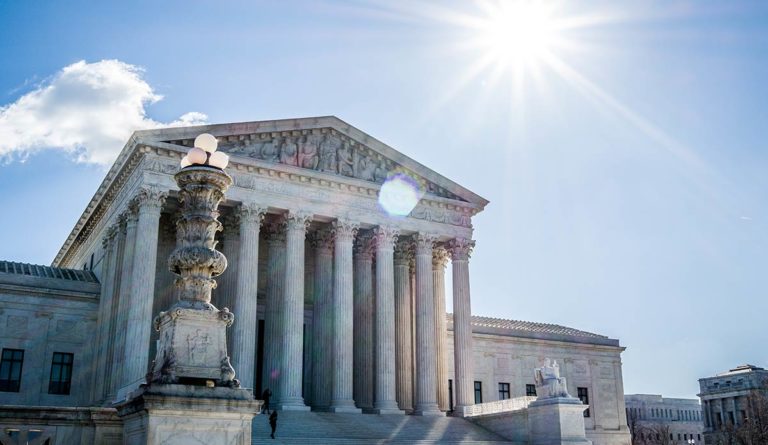Crisis Pregnancy Centers Center Stage at SCOTUS
NIFLA v. Becerra, currently before the Supreme Court, is a challenge to California's Reproductive FACT Act, which requires unlicensed facilities such as crisis pregnancy centers to post a notice stating that they are not a licensed medical facility.

Read Time: 5 minutes
Published:
The National Institute of Family and Life Advocates (NIFLA) is challenging the California Reproductive FACT (Freedom, Accountability, Comprehensive Care, and Transparency) Act before the U.S. Supreme Court. On March 20, 2018, SCOTUS heard oral arguments in the NIFLA v. Becerra case.
What is the Reproductive FACT Act?
The Reproductive FACT Act was signed into law in California by Governor Jerry Brown on October 9, 2015. The law requires licensed medical facilities to post a notice stating that California has public programs where low-income women can access free or inexpensive family planning services, including abortion. It also requires unlicensed facilities, such as crisis pregnancy centers (CPCs), to post a notice stating that they are not a licensed medical facility.
The notice that the licensed facilities must post states:
“California has public programs that provide immediate free or low-cost access to comprehensive family planning services (including all FDA-approved methods of contraception), prenatal care, and abortion for eligible women. To determine whether you qualify, contact the county social services office at [insert the telephone number].”
The notice that unlicensed facilities must post states:
“This facility is not licensed as a medical facility by the State of California and has no licensed medical provider who provides or directly supervises the provision of services.”
What are crisis pregnancy centers?
The mission of CPCs is to dissuade women from having abortions. These unlicensed facilities are often mistaken for medical clinics. Generally, though, there are no licensed medical staff present. CPCs are often located near licensed reproductive health clinics to confuse women seeking abortions and other family planning services.
They use a variety of tactics to achieve this goal, including providing false information about the risks of abortion. Women are often told that having an abortion can lead to an increased risk of breast cancer or infertility, contrary to scientific evidence.
NIFLA’s Argument
NIFLA argued that the requirement to post the notices above violates the right to free speech guaranteed under the First Amendment. Michael P. Farris, representing NIFLA, said, “California took aim at pro-life pregnancy centers by compelling licensed centers to point the way to an abortion and imposing onerous advertising rules on unlicensed centers that do not provide ultrasounds or any other medical services.”
When Justice Ruth Bader Ginsburg asked if it would also be unconstitutional to require abortion providers to tell patients that services were available if they chose to carry their pregnancies to term, Farris argued that it would not. He cited the Planned Parenthood of Southeastern Pennsylvania v. Casey ruling upholding most of Pennsylvania’s informed consent and waiting period requirements. He also cited Harris v. McRae, saying that the decisions in these cases “indicated that the state has an additional interest beyond the health of the woman in the interest of advancing the life of the unborn child, to a degree.”
Farris also argued that the California statute targets pro-life pregnancy centers. He reasoned that the law is limited to primarily nonprofit community clinics, excluding private practices. He stated that “clinics that are in general practice” are exempt from this requirement, as well as clinics that sign up for the California Family PACT program. Based on these exemptions, Farris argued that the only facilities targeted are pro-life pregnancy centers.
Becerra’s Argument
Joshua A. Klein, representing the respondents, also cited Planned Parenthood of Southeastern Pennsylvania v. Casey in his argument, stating that the notices ensure patients are fully informed about their choices. He also argued that the law “empowers the woman by explaining that her financial circumstance does not make her unable to access alternative and supplemental care.”
When asked about the NIFLA claim that the statute targets crisis pregnancy centers, Klein said, “Your Honor, the disclosure is targeted at women who seek free care for pregnancy, not at any particular viewpoint.” Justice Samuel A. Alito, Jr. challenged Klein on the numerous exempted facilities, such as private practices and clinics in the California Family PACT program. Klein responded that the state was trying to apply the speech requirements narrowly, something, he said, the Court has argued for in the past.
Klein also argued that the law targets nonprofit clinics because they typically see women in need of low-cost or free pregnancy services. He stated that California Family PACT providers are exempt from posting the notice because they receive incentives to help women enroll in state healthcare programs.
Finally, Klein cited Zauderer v. Office of Disciplinary Counsel in his argument. The decision in Zauderer states that requiring the dissemination of factual information is constitutional as long as it meets two conditions: 1) it is not “unduly burdensome”, and 2) it is “reasonably related to the State’s interest in preventing deception of consumers.”
When will we know the Court’s decision?
The U.S. Supreme Court is expected to announce its decision in June 2018.
Feature image: Phil Roeder, Supreme Court of the United State, used under CC BY 2.0



